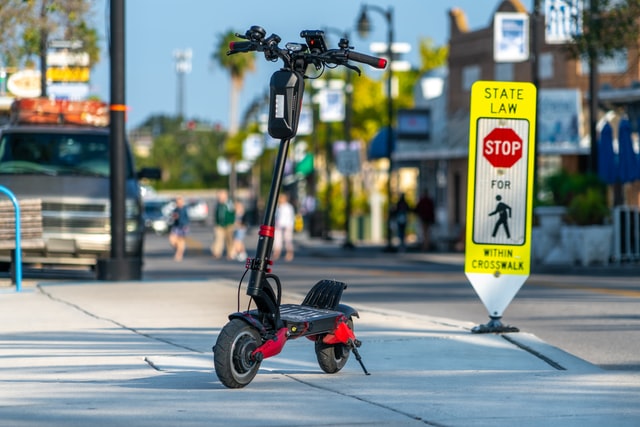
Photo: Varla Scooter on Unsplash
Mobility data framework could curb public-private disputes
10 November 2021
by Sarah Wray
A new framework for the responsible use of mobility data could help to prevent future disputes between the private and public sector.
Developed through a collaboration of more than 20 cities, mobility service providers, technology companies, privacy advocates, and academics, the Privacy Principles for Mobility Data are intended to help companies and agencies assess technical and policy decisions that have implications for privacy.
They include a commitment to collect the minimum amount of data for clearly defined purposes and communicate openly about mobility data.
The collaborative was convened by the New Urban Mobility Alliance (NUMO), North American Bikeshare & Scootershare Association (NABSA) and Open Mobility Foundation (OMF).
Friction
Mobility data has led to some tensions between cities and the private sector in the past. Uber and the American Civil Liberties Union (ACLU) launched separate legal action against the Los Angeles Department of Transportation (LADOT) over its use of the Mobility Data Specification (MDS) requiring e-scooter firms to provide real-time data to the city.
In May last year, Uber transferred its micromobility arm Jump to Lime as part of an investment deal and in February the ACLU’s case was dismissed by a US judge.
The MDS was developed by LADOT and is now managed by the OMF and used by over 120 cities.
In February, journalist Kate Kaye reported that a mobility-related pilot project between Portland’s regional government entity Metro and urban data platform Replica had been shelved following disagreements about data and privacy.
Sebastian Castellanos, NUMO’s research lead, told Cities Today: “The conversation around mobility data and privacy has been complex and challenging, especially when it comes to cities and private-sector organisations. It was pivotal to bring a diverse group of contributors from the public sector, private sector, academia, advocacy and beyond — all with differing perspectives and goals — together to clearly articulate the shared values of the industry regarding mobility data and privacy.
“As it turns out, we were all more aligned than not on our values. Those values coalesced into a framework that provides a way to start the conversation about mobility data and privacy off on the right foot. The principles are intended to be a guiding ‘North Star’ to assess technical and policy decisions that have implications for privacy when handling mobility data, and we hope they are a tool for navigating this important issue.”
The framework
The seven principles are:
- We will uphold the rights of individuals to privacy in their movements.
- We will ensure community engagement and input, especially from those that have been historically marginalised, as we define our purposes, practices, and policies related to mobility data.
- We will communicate our purposes, practices, and policies around mobility data to the people and communities we serve.
- We will collect and retain the minimum amount of mobility data that is necessary to fulfil our purposes.
- We will establish policies and practices that protect mobility data privacy.
- We will protect privacy when sharing mobility data.
- We will clearly and specifically define our purposes for working with mobility data.
“Developing the principles was a collaborative process,” said Steve Hoyt-McBeth of the Portland Bureau of Transportation, who served on the Principles’ Drafting Committee. “For more than a year, a diverse group of stakeholders has met regularly to learn, build consensus, and draft the Principles.”
Waffiyyah Murray, the City of Philadelphia’s Better Bike Share Program Manager, also served on the drafting committee and other city contributors came from San Francisco Municipal Transportation Agency, Portland Metro and the cities of Long Beach, Minneapolis and Kelowna. Private sector companies included Bird, Populus, Lacuna, Spin, Lyft and Uber.
“Data is key to building better transportation ecosystems that serve the needs of all communities and allow everyone to access daily needs and economic opportunity,” said Kelsey Finch, Senior Counsel of Future of Privacy Forum. “But that data must be used responsibly, and the privacy of individuals and communities must be protected. The principles are a framework that provides a starting point for dealing with the ethical collection, use, and storage of mobility data.”
From principle to practice
Organisations from the public and private sectors are invited to endorse the principles, which means “committing to work in good faith to put them into practice.”
So far, they have been endorsed by organisations including NABSA, OMF, NUMO, Via, Blue Systems and Autonomy. No cities are yet listed.
Castellanos said the organisations and individuals involved in developing the principles haven’t necessarily endorsed them.
“The organisations that have endorsed the principles have taken the extra step to joining a community dedicated to putting the principles into action and expanding the conversation on mobility data and privacy,” he commented.
NUMO, NABSA and OMF are working on developing additional resources and urging others to develop and share tools based on the principles.
Image: Varla Scooter on Unsplash








